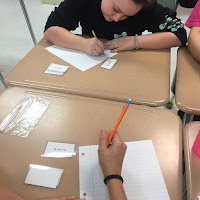Algebraic Expressions - Millionaire Game
Like Terms Invaders (aka Space Invaders)
Distributive Property Practice
Combining Like Terms and Distributive Property
▼
Friday, December 11, 2015
Wednesday, December 9, 2015
MORE EQUIVALENT EXPRESSIONS
Students were given the following paper. 
Round 1: Each student was handed an expression. They had to write it in the first box of the grid and simplify it.
Here is a quick demonstration of how everyone got their next problem to work.

Round 1: Each student was handed an expression. They had to write it in the first box of the grid and simplify it.
- Make a paper wad out of their paper and threw it in the middle of the room.
- When I gave the direction they went into the pile and picked a new paper wad.
Round 2: The next expression (must have scratch paper) students had to use scratch paper to determine where they put the next expression.
- If the expression is equivalent to the first, expression #2 must be written in the box beside expression #1.
- If the expression is different than expression #1, then expression #2 must be written in the box below expression #1.
- Make a paper wad and return to the middle.
- Get a new paper.
Round 3 and so on: This continues until the grid if filled up. There are a total of 24 expressions.
- If a student gets to the bottom of column 1 and thinks another expression must go there, he/she has made a mistake. There are only 6 different expressions used in this activity.
- They will need to go back and check their work or have a peer or myself double check their work.
- The distributive property has caused most of the problems. Please remember to multiply the number outside the parenthesis by each term inside the parenthesis.
Tuesday, December 8, 2015
EQUIVALENT EXPRESSIONS
Today we are working on creating equivalent expressions. In order to do this we must use everything we know about combining like terms and the distributive property. When determining if expressions are equivalent it is recommended that we simplify them all first in order to see if they are the same.
To start class some groups started with the matching game. Students were asked to match the equivalent expressions.

Other groups worked on a matching worksheet. The directions were very specific and told them that some expressions had more than 1 match.
To finish off class students were given 8 multiple choice questions and a short response question to complete for homework.
To start class some groups started with the matching game. Students were asked to match the equivalent expressions.

Other groups worked on a matching worksheet. The directions were very specific and told them that some expressions had more than 1 match.
To finish off class students were given 8 multiple choice questions and a short response question to complete for homework.
Monday, December 7, 2015
READING, WRITING, AND EVALUATING ALGEBRAIC EXPRESSIONS
Friday, December 4, 2015
WEEKLY RE-CAP and WHAT'S TO COME!
We have been busy this week combining like terms and now trying to write our own expressions. I realize now that I have done this is a very wonky order (I'll try to remember this next year). Many students became confused about writing down "10 added to a number" as m + 10, having the argument that it couldn't be done because they are not like terms. Golly that made my heart happy. I knew they had been listening to me.
Because I taught these out of order I had to convince them that this had nothing to do with combining like terms. I explained that we would turn around and substitute a value for the variable (which we have already studied)
Today in class students are taking a Moby Assessment on 6.EE.2 and then completing a crossword puzzle I created relating to translating word phrased into algebraic expressions.
Next week, we will be reviewing how to read, write, and evaluate an expression, how to simplify an expression and substitute for the variable, so we can move on to equations to finish off 2015.
Because I taught these out of order I had to convince them that this had nothing to do with combining like terms. I explained that we would turn around and substitute a value for the variable (which we have already studied)
Today in class students are taking a Moby Assessment on 6.EE.2 and then completing a crossword puzzle I created relating to translating word phrased into algebraic expressions.
Next week, we will be reviewing how to read, write, and evaluate an expression, how to simplify an expression and substitute for the variable, so we can move on to equations to finish off 2015.
TRANSLATING EXPRESSIONS HELPFUL TERMS
This was added to the math notebooks on page 35. Students are free to refer to this image at any time. It will be helpful on today on their crossword puzzle.
TRANSLATING ALGEBRAIC PHRASES INTO EXPRESSIONS
To start class students were given one of these note cards. Students were asked:
- What problem have you been given?
- How do you know you need to add/subtract/multiply/divide?
- Does what you think make sense?
They were then instructed to find another student in the classroom that had the same note card. I asked that they share their expression with each other. I then asked:
- Did you have the expression?
- What about the phrase made you think add/subtract/multiply/divide?
- Are there certain words in the phrase that made you do specific things?
Students were then directed to find someone with a different card. I considered them the expert of their expression. They then taught their friend, answered questions, and offered assistance if needed.






















